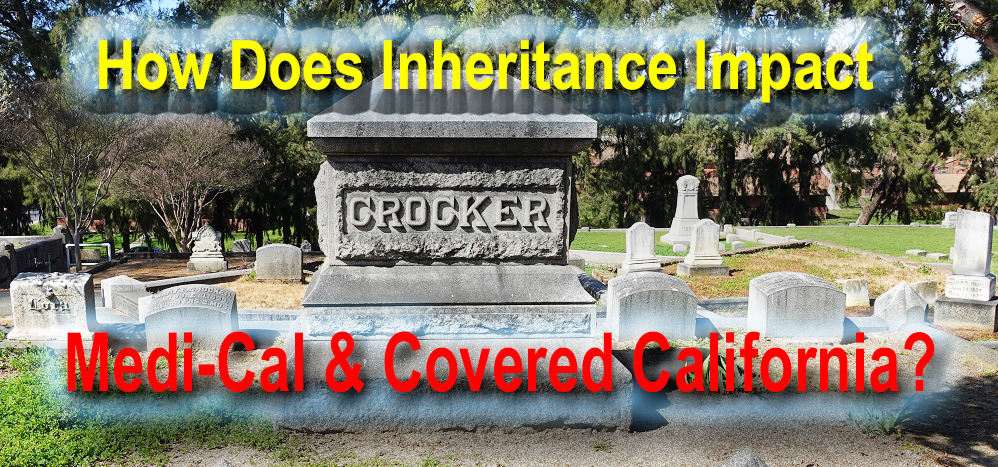When you receive an inheritance of money, property, or real estate, the proceeds can impact your eligibility for certain Medi-Cal programs and the Covered California subsidy. The best course of action is to always report the inheritance and let either Medi-Cal or Covered California determine the effects. You may also need to consult an income tax professional if the inheritance is particularly complicated. Below are some general rules on how an inheritance might your health insurance.

MAGI Medi-Cal and Inheritance
If you were determined eligible for Medi-Cal through an application at Covered California, you most likely have MAGI Medi-Cal. Modified Adjusted Gross Income (MAGI) Medi-Cal only looks at your income, usually on a monthly basis, it does not consider your assets. You can have lots of cash in the bank, cars, homes, and a stock portfolio, and still qualify for MAGI Medi-Cal.
When you receive an inheritance of money, that cash is an asset, no different than a savings account. The inheritance is not counted as monthly income. It is generally considered a one-time lump sum distribution. Consequently, an inheritance of money should not impact your MAGI Medi-Cal eligibility.
What could affect your MAGI Medi-Cal is if the inheritance is generating taxable income such as interest and dividends. That taxable income can be considered monthly income. If the taxable income stream from the inheritance is large enough, it may push your monthly income out of the Medi-Cal range. But have no anxiety, you can then transition to Covered California with the subsidy assistance to buy affordable private insurance.
While your county Medi-Cal office should not count your inheritance as monthly income, affecting your eligibility, it is always best to report the inheritance distribution to them when it occurs, not before. Once you report the distribution, you now have a record of reporting the change and you have done your duty to report any changes to your status within 10 days.
Status Change Report Medi_Cal Form MC176S_ENG_0309_2022
For reporting a change to your household for Medi-Cal eligibility.
Non-MAGI Medi-Cal Inheritance
Most of the Medi-Cal health insurance programs and assistance fall under the Non-MAGI or Conditional Medi-Cal type. Generally, people with disabilities, certain medical conditions, and Medicare may be eligible for Non-MAGI conditional Medi-Cal. One of the conditions of eligibility is a combination of income AND assets.
Consequently, receiving an inheritance of money might increase your assets changing they type of Medi-Cal you have or becoming ineligible altogether. For example, an individual on Medicare, may be eligible for extra help from Medi-Cal if that person has less than $8,400 in resources in 2022 (resource limits are different for couples and qualified disabled working individuals.)
Money in a savings account is a countable resource. Therefore, if an inheritance increases the countable resources over $8,400 for that individual, they may lose extra help paying for Medicare premiums and health care expenses. However, some resources are not counted against your eligibility for some programs. Your primary residence, one car, burial plot, furniture, and personal items are excluded from consideration for some Medi-Cal programs.
Because an inheritance may be compromised of many types of items (money, jewelry, stocks, furniture, property, etc.) it is always best to report the entire inheritance to your county Medi-Cal office. Your Medi-Cal case worker will be able to evaluate the different assets and determine which ones will impact your eligibility. Some assets may not affect your eligibility, but the income they produce could increase your income and that might impact your eligibility.
Covered California Inheritance
An inheritance does not need to be reported to Covered California if it will not be considered taxable income. The health insurance subsidies from Covered California are based on the estimated Modified Adjusted Gross Income for the household, not assets. An inheritance can effect the subsidy if it triggers a taxable event or generates taxable income.
For example, if you inherit a piece of property, it won’t affect your income. However, if you sell that property and it generates a capital gain that is taxable, your income will increase, which will decrease your subsidy. The Premium Tax Credit subsidy is reconciled on the federal tax return. An unexpected increase in taxable income may result in having to repay some of the subsidies on your federal income tax return.
Another example is if the inheritance generates taxable income. Perhaps you inherit a rental property. If the property generates taxable income to you, that will increase your annual MAGI and could result in the repayment of subsidies.
While you don’t have to report an inheritance to Covered California, you do need to consider if the inheritance will trigger a taxable event or taxable income that may change how much Premium Tax Credit subsidy you are eligible for.


